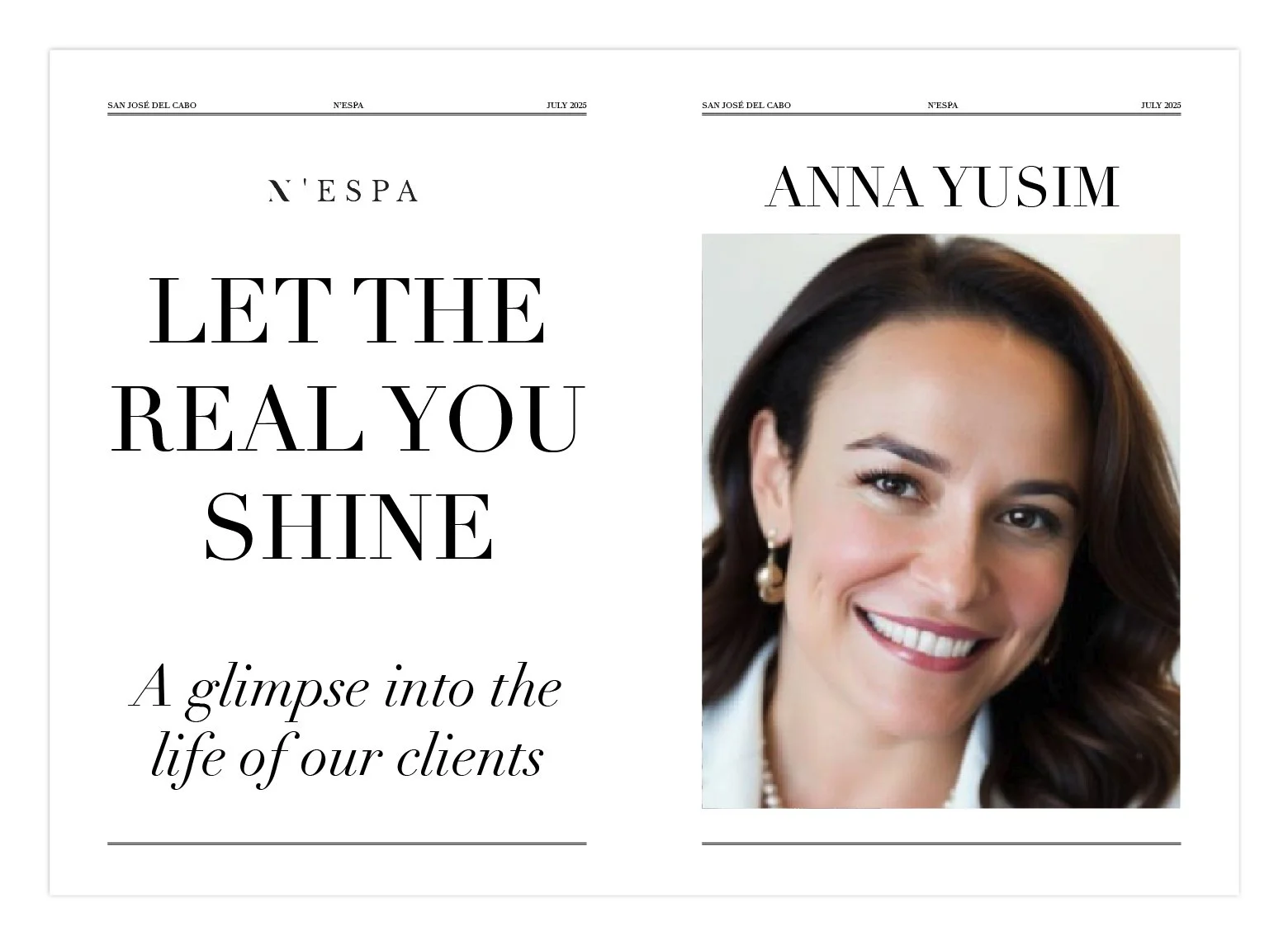A Mind Aligned: The Integrative Vision of Dr. Anna Yusim
On a sun-drenched terrace in Cabo San Lucas, after a replenishing facial at Nespa, Dr. Anna Yusim leans into a conversation with her colleague, our very own Dr. Brigitte Hanly. She’s animated—spirited in the kind of way that suggests excitement isn’t a spike in her day but a rhythm. The topics are clinical, spiritual, personal. They blur. That’s the point.
Dr. Yusim is one of those rare figures in modern psychiatry who insists the mind is not merely a biological organ but a vessel for something more elusive: the soul. In a discipline long preoccupied with the chemical, the behavioral, and the measurable, she has managed—bravely, some might say provocatively—to make room for the sacred.
The daughter of Soviet immigrants and a graduate of Stanford University and Yale Medical School, Yusim's credentials shimmer with establishment pedigree. Her early work with neuroendocrinologist Robert Sapolsky at Stanford, and her psychiatry residency at NYU, were marked by rigorous inquiry and a deepening disquiet. Despite the accolades—and there were many, from the National Institute of Mental Health to the American Psychoanalytic Association—something gnawed at her sense of purpose.
“I realized,” she says now, “that I was healing minds, but not always touching lives.”
So, she left. Not psychiatry, but the confines of what it had become.
In the years that followed, she journeyed to over 70 countries, studying Kabbalah in Israel, meditating in monasteries in Nepal, undergoing spiritual initiations in the Andes and India. These weren’t sabbaticals. They were pilgrimages. And they would eventually serve as the foundation for a new kind of psychiatry—one that treats not just pathology, but potential.
Her bestselling book Fulfilled: How the Science of Spirituality Can Help You Live a Happier, More Meaningful Life was born of that awakening. It’s a blend of memoir, scientific exposition, and quiet rebellion—an argument for the soul in a clinical age.
“I wrote Fulfilled,” she says, “because I had to. Because what I discovered in my own journey was too powerful not to share.”
At Yale Medical School, where she now serves as Clinical Assistant Professor, Yusim is in the process of institutionalizing what was once deeply personal. Alongside Dr. Christopher Pittenger, she’s founding the Yale Mental Health and Spirituality Center—a first-of-its-kind initiative that will bridge the Yale Medical and Divinity Schools. It’s her way of bringing the sacred back into the sanitized corridors of academic psychiatry. She calls it her “comfort zone,” though the term, in this context, feels more like a declaration of identity than a confession of ease.
“It’s what I’m meant to do,” she says.
Indeed, Yusim’s days unfold like a study in dualities—clinical and mystical, hard data and intuitive knowing. As Chief Medical Officer of Conscious Health in California, she oversees treatments that span the modern and the ancient: ketamine therapy, transcranial magnetic stimulation, psycho-spiritual counseling. Meanwhile, in Miami, she helps guide SuperMind, a psychiatric tech startup blending EEG biofeedback and binaural beat meditation with traditional coaching. The tools may change, but the mission doesn’t: to awaken purpose.
And her clientele is, to put it modestly, impressive. From Fortune 500 CEOs to Olympic medalists and Hollywood luminaries, Yusim’s patient roster is a quiet testament to a truth too often whispered: achievement doesn’t inoculate against emptiness. Her work, at its core, is about reconnection—to values, to meaning, to the ineffable thing we call self.
“I ask every client: What allows you to excel?” she says. “And then: What brings you joy?” These, she explains, are not therapeutic warmups. They are diagnostics. They are spiritual triage.
In person, Yusim is both warm and precise, a combination that helps explain her appeal to those used to command and control. She listens as though time is irrelevant and speaks as though the stakes are eternal. And yet, for all her high-wire achievements, she is clear about what grounds her: dinners with friends, moments with family, conversations in Cabo that stretch into the horizon.
Yusim’s approach—what she calls “spiritual psychiatry”—is not a rejection of science but an expansion of it. Her workshops on burnout, resilience, and intuitive development aren’t fringe; they’re frontline. She trains hospital systems, Fortune 100 teams, and spiritual communities alike. Onstage, she is magnetic. Offstage, she is methodical, a clinician with more than 370 published works and a CV that reads like a scholar’s passport.
But perhaps what’s most radical about Dr. Anna Yusim isn’t her credentials, or even her unconventional methods. It’s her refusal to choose between two poles of modern life: the clinical and the spiritual. In her world—and increasingly, in ours—they are one and the same. Healing, after all, is not just the cessation of pain, but the return to self.
“What allows me to excel,” she muses, “is knowing that what I do aligns with who I am.”
That, in the end, may be her greatest gift to others—not just healing, but coherence. In a field obsessed with outcomes, Dr. Yusim reminds us to look for alignment. And perhaps that’s what makes her medicine feel like something more: a return to wholeness in a fractured age.
We’re also quietly grateful that she chooses Nespa as one of the rare places to realign—body, mind, and spirit—before returning to the work of helping others do the same.
For those curious to explore her philosophy more deeply, her bestselling book, Fulfilled: How the Science of Spirituality Can Help You Live a Happier, More Meaningful Life, is a luminous guide. It’s available on Amazon.

